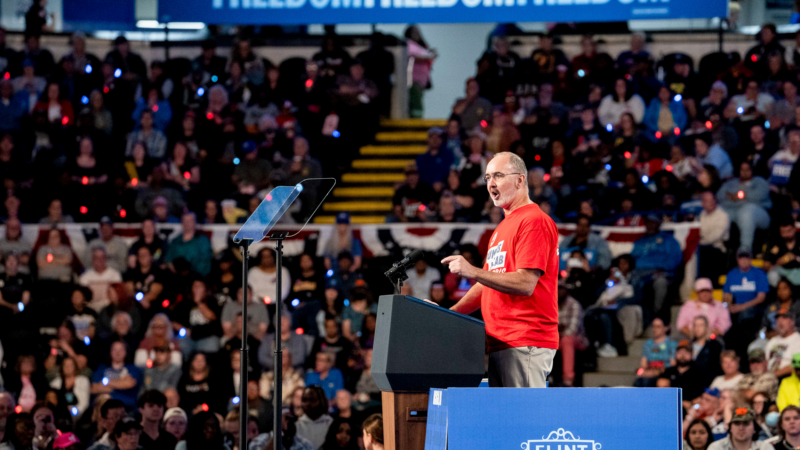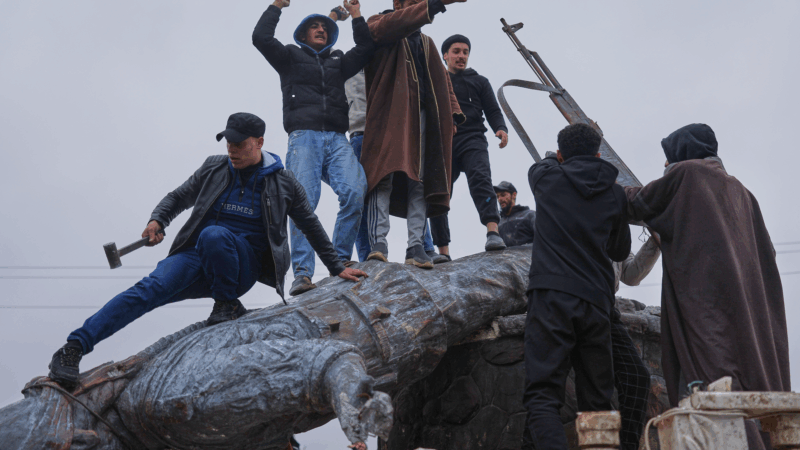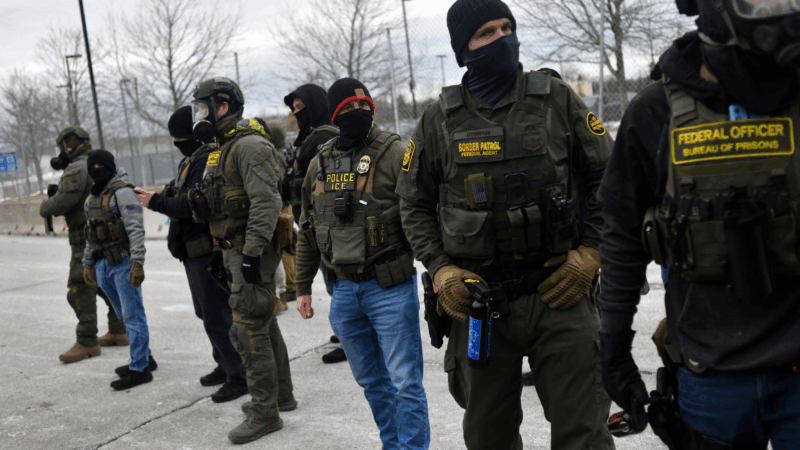UAW President Shawn Fain explains why he supports Trump’s tariffs
President Trump’s announcements on tariffs have dismayed many of his erstwhile supporters on Wall Street. The suddenness — and steepness — of the tariffs announced last Wednesday prompted some global manufacturers to pause shipments to the U.S., and led economists to raise the odds of recession.
But an earlier set of tariffs still has the support of Shawn Fain, president of the United Auto Workers.
Fain supported Democrat Kamala Harris with a fiery convention speech in 2024, and opposes many of Trump’s stances on union labor, but contends the president struck a blow that leaders of both parties have resisted for decades.
Fain represents nearly a million current and retired workers in multiple industries, of whom he estimates a few hundred thousand are now employed by the auto industry. It’s a dramatic decline from the 1.5 million autoworkers alone the UAW represented in the mid-20th century.
Below are highlights from an NPR interview with an unconventional supporter of the tariffs. Some answers have been lightly edited for length and clarity.
He’s not sure about all the tariffs but favors those for his industry.
Fain referred to last Wednesday’s announcement of global tariffs as “reckless,” but firmly supports an earlier round of tariffs on the U.S. auto industry. Those tariffs both help and hurt U.S. auto companies, because they produce so much in Canada and Mexico. Auto parts typically cross the border multiple times as a car is assembled. GM has already said it will move some production back to Indiana — but Stellantis ordered layoffs.
For Fain, tariffs address a historic wrong. “We’ve sat here for the last 30 plus years, with the inception of [the North American Free Trade Agreement] back in 1993-94, and watched our manufacturing base in this country disappear,” he said.
He doesn’t care much about the stock market’s decline.
“You know, half of Americans don’t even have stock,” he said. (Some estimates say well over half of Americans own some stock.)
“Sixty percent of Americans have no retirement savings,” he said. “So when I hear all the crying about the stock market, this is just Wall Street. They’re people that are already rich, and at the end of the day, most working class people are trying to survive right now. And it’s infuriating that our livelihoods have been stripped from us for decades and no one’s cared.”
He acknowledges that tariffs may raise prices.
Most economists have said that the cost of import taxes is passed on to consumers. Asked if that is good for the working class, Fain replied, “Well, no, but that’s a choice. This is the problem with our system. It’s so upside down. The billionaire class and the corporate class, they always get their profits. They always take their cut, and they always pass anything bad on to consumers.”
Fain nonetheless acknowledged that he sees tariffs as a way to prevent exceptionally low prices driven by cheap labor: “The point of tariffs is to eliminate the race to the bottom where we’re exploiting people.”
Despite the suddenness of Trump’s move, he insists the auto industry can adjust.
Fain was calling from Warren, Mich., from which Stellantis recently shifted some production to Mexico. “There’s 2,000 workers that got laid off. They could put them back to work in a month and be building Ram trucks back there,” he added.
He dismisses the idea that the disruption may not work out
Fain rejected Wall Street warnings of a recession, including one by a JP Morgan economist.
“Where was JPMorgan, all these people, when the companies were jacking up prices and price gouging the last three and four years?” he said. “Where was their outcry then? As long as the stock market’s doing good, that’s all they care about.”
He also minimized an idea advanced by many economists: that any factories “reshored” to the U.S. are likely to be highly automated, because of the advances in robotics and the high cost of labor. He said such factories would at least require “skilled trade jobs which are even better paying jobs. We just have to train people.”
“The sad reality of this is [the idea that] it’s a bad thing that we put manufacturing back in this country because labor is expensive. That is pathetic. I believe it was one of the former presidents [who] said, I pity the businessman that wants to make a coat so cheap that the person making the coat will starve in the process. I mean, that is sad,” Fain said.
The audio version of this interview was produced by Mansee Khurana and edited by Arezou Rezvani. The digital version was produced and edited for the web by Majd Al-Waheidi.
Syrian government announces a ceasefire with the Kurdish-led Syrian Democratic Forces
Syria's new leaders, since toppling Bashar Assad in December 2024, have struggled to assert their full authority over the war-torn country.
U.S. military troops on standby for possible deployment to Minnesota
The move comes after President Trump again threatened to invoke the Insurrection Act to control ongoing protests over the immigration enforcement surge in Minneapolis.
Martin Luther King Jr. had a dream … about health care
A doctor from Nigeria tells what Martin Luther King Jr. taught him about health, Justice and inequality.
Sunday Puzzle: It takes two
Ilyse Levine-Kanji of Westborough, Massachusetts plays the puzzle with Weekend Edition Puzzlemaster Will Shortz and host Ayesha Rascoe.
Venezuela: Maduro’s enforcer Cabello still central to power
The ousting of Venezuela's president raised hopes of change — but the politician now controlling the streets shows how little has really shifted.
Amid ICE clashes, New Hampshire bishop urges clergy to prepare their wills
The Episcopal bishop of New Hampshire told priests protesting ICE to get their wills and affairs in order. Some praise the bishop, while other priests say they never signed up to be martyrs.








